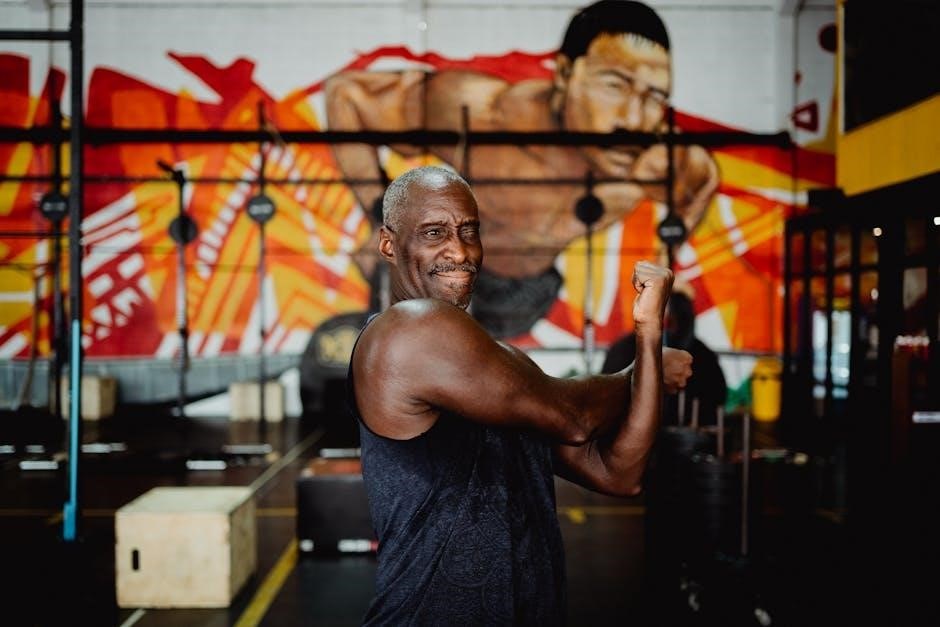Deacon training in the Black Church is vital for spiritual growth‚ community support‚ and leadership development. Manuals and guides provide biblical principles‚ practical duties‚ and cultural significance‚ ensuring deacons serve effectively.
1.1. Overview of the Role of Deacons in the Black Church
Deacons in the Black Church serve as spiritual leaders‚ assisting in worship‚ community support‚ and church governance. Their role is multifaceted‚ encompassing servant leadership‚ mediation‚ and preserving harmony. Deacons are pillars of strength‚ providing guidance and fostering unity within the congregation and the broader community‚ deeply rooted in African American church traditions and cultural significance.
1.2. Importance of Deacon Training in the African American Church Tradition
Deacon training is crucial in the African American Church Tradition‚ empowering deacons to fulfill their roles effectively. It ensures they are equipped with biblical knowledge‚ leadership skills‚ and cultural understanding. Proper training strengthens their ability to serve the congregation‚ maintain harmony‚ and address community needs‚ preserving the rich legacy of deaconship in the Black Church tradition.

Biblical Foundations of Deacon Ministry
The role of deacons is rooted in scripture‚ with key passages like Acts 6:1-7 and 1 Timothy 3:8-12 providing guidelines for their service and qualifications.
2.1. Key Scriptures on Deaconship (Acts 6:1-7‚ Philippians 1:1‚ 1 Timothy 3:8-12)
Acts 6:1-7 establishes deacons as servants‚ chosen for their faith and wisdom. Philippians 1:1 refers to deacons as church servants. 1 Timothy 3:8-12 outlines qualifications for deacons‚ emphasizing integrity‚ faithfulness‚ and family leadership‚ providing a biblical framework for their ministry and conduct in the church.
2.2. The Historical Development of the Deacon Office in the Church
The deacon office originated in the early church‚ as seen in Acts 6:1-7‚ where deacons were appointed to serve widows. Over centuries‚ the role evolved‚ with deacons becoming key leaders in worship‚ governance‚ and community care. In the Black Church‚ deacons historically played a vital role in spiritual and social support‚ adapting their ministry to meet the unique needs of African American communities.

Qualifications and Characteristics of a Deacon
Deacons must be blameless‚ the husband of one wife‚ and manage their households well. They should be reverent‚ not given to wine‚ and not covetous‚ holding the mystery of the faith with a clear conscience. Their faith is tested first‚ ensuring they serve with integrity and humility.
3.1. Spiritual Qualifications (1 Timothy 3:8-12)
Deacons must be blameless‚ the husband of one wife‚ and manage their households well. They should be reverent‚ not given to wine‚ and not covetous‚ holding the mystery of the faith with a clear conscience. Their faith is tested first‚ ensuring they serve with integrity and humility‚ free from dishonest gain‚ and fully committed to God’s work.
3.2. Personal and Leadership Qualities for Effective Ministry
3.2. Personal and Leadership Qualies for Effective Ministry
Deacons must exhibit strong leadership‚ servanthood‚ and integrity. They should demonstrate empathy‚ humility‚ and a willingness to serve others. Effective communication and relational skills are essential for building trust within the church and community. Leadership qualities include wisdom‚ discernment‚ and the ability to guide others compassionately‚ fostering unity and growth in the congregation.
The Role and Responsibilities of Deacons
Deacons assist in worship‚ provide community support‚ and govern church affairs. They mediate conflicts‚ foster unity‚ and serve as spiritual leaders‚ ensuring harmony within the congregation.
4.1. Servant Leadership in the Local Church
Deacons exemplify servant leadership by serving others humbly. They assist pastors‚ support members‚ and engage in community outreach. Their role fosters a culture of compassion‚ unity‚ and spiritual growth within the church‚ aligning with biblical teachings and cultural traditions of the Black Church‚ ensuring effective ministry and community impact through selfless service.
4.2. Practical Duties of Deacons in Worship‚ Community Service‚ and Church Governance
Deacons assist in worship by preparing elements‚ supporting pastors‚ and ensuring orderly services. They serve the community through outreach‚ visitations‚ and addressing member needs. In governance‚ deacons provide administrative support‚ maintain harmony‚ and uphold church principles. Their roles bridge spiritual and practical needs‚ fostering a cohesive and compassionate church environment.
Deacon Training Programs in the Black Church
Deacon training programs in the Black Church focus on biblical principles‚ leadership development‚ and community service. Manuals and structured curricula guide deacons in their ministries effectively today.
5.1. Structure and Curriculum of Deacon Training Programs
Deacon training programs in the Black Church are structured to equip individuals with biblical knowledge‚ leadership skills‚ and practical ministry tools. Curricula often include biblical studies‚ servant leadership principles‚ and community service strategies. Programs may also cover church governance‚ worship assistance‚ and conflict resolution‚ ensuring deacons are well-prepared to serve effectively in their roles.
5.2. Annual Training and Development Opportunities for Deacons
Annual training programs for deacons emphasize spiritual growth‚ leadership enhancement‚ and practical application of ministry skills. These sessions often include workshops‚ seminars‚ and interactive exercises tailored to address contemporary church needs. Deacons engage in reflective learning‚ fostering a deeper commitment to servant leadership and community engagement‚ ensuring they remain effective ministers in the Black Church tradition.

The Impact of Deacons on the Black Church and Community
Deacons serve as pillars of strength‚ providing spiritual guidance‚ community support‚ and fostering harmony. Their leadership enhances fellowship‚ addressing social needs and uplifting both the church and community.
6.1. Deacons as Pillars of Strength in the Church
Deacons are vital pillars‚ offering spiritual and practical support to the congregation. They provide compassionate care‚ resolve conflicts‚ and maintain harmony‚ ensuring the church thrives as a unified body of believers.
6;2. Deacons’ Role in Social and Community Support
Deacons are instrumental in providing social and community support‚ addressing local needs‚ and fostering unity. They organize outreach programs‚ assist the underserved‚ and advocate for justice‚ extending the church’s mission beyond its walls into the community.

Resources for Deacon Training
Manuals like the “DEACONS TRAINING MANUAL 2007” and guides from Firebrand Church provide practical advice‚ biblical principles‚ and leadership strategies for effective deacon ministry and community engagement.
7.1. Recommended Manuals and PDF Guides for Deacon Training
Manuals like the “DEACONS TRAINING MANUAL 2007” and guides from Firebrand Church offer detailed insights into deaconship‚ including biblical principles‚ practical duties‚ and leadership strategies. These resources are essential for deacons to understand their role and serve effectively in the Black Church‚ providing both spiritual and community-focused guidance.
7.2. The Role of Pastors and Elders in Deacon Development
Pastors and elders play a crucial role in deacon development by providing mentorship and guidance. They oversee training programs‚ ensuring deacons understand their biblical roles and responsibilities. Their leadership helps equip deacons to serve effectively in worship‚ community service‚ and church governance‚ fostering a strong‚ spiritually grounded ministry within the Black Church.

The Cultural Significance of Deacons in the Black Church
Deacons in the Black Church are cultural pillars‚ embodying servant leadership‚ spiritual guidance‚ and community support. Their role preserves harmony and strengthens the church’s legacy and influence.
8.1. Deacons as Leaders in African American Church Tradition
Deacons are pillars of strength in the African American Church‚ serving as spiritual leaders and community servants. Their role‚ rooted in biblical principles‚ emphasizes integrity‚ compassion‚ and faith. Trained to address both spiritual and practical needs‚ deacons embody servant-leadership‚ fostering unity and guiding the congregation with dedication and wisdom.
8.2. The Legacy of Deacons in the Black Church Movement
Deacons have long been pillars of strength in the Black Church Movement‚ preserving harmony and fostering community support. Their legacy reflects a commitment to servant-leadership‚ guiding the church through challenging times while maintaining spiritual integrity. The historical contributions of deacons continue to inspire and shape the role of deacons in modern ministry and community service.

Challenges and Opportunities in Modern Deacon Ministry
Modern deacon ministry faces challenges like adapting to cultural shifts and technological advancements while opportunities exist to innovate outreach‚ enhance spiritual engagement‚ and foster inclusive leadership practices effectively.
9.1. Adapting Deacon Training to Contemporary Church Needs
Modern deacon training must address evolving church needs by incorporating innovative methods‚ such as workshops‚ online resources‚ and community-focused initiatives. This ensures deacons remain relevant and effective in addressing contemporary challenges while upholding biblical principles and cultural traditions within the Black Church‚ fostering spiritual growth and community engagement.
9.2. The Role of Women as Deacons in the Black Church
Women serve as vital leaders in the Black Church‚ with their roles as deacons evolving over time. Historical precedents‚ such as Phoebe in Romans 16:1‚ inspire contemporary discussions about women’s ordination. Many Black Churches now recognize women deacons‚ emphasizing their spiritual gifts and leadership in community service‚ worship‚ and governance‚ reflecting the church’s commitment to inclusivity and biblical principles.

Leadership Development for Deacons
Deacon training emphasizes leadership development through structured programs‚ equipping deacons with essential skills for effective ministry and community impact‚ aligning with the Black Church’s rich traditions.
10.1. Building Strong Leadership Skills for Deacons
Deacon training focuses on enhancing leadership skills through structured programs‚ emphasizing communication‚ decision-making‚ and mentorship. These skills empower deacons to guide effectively‚ fostering unity and service within the church and community‚ aligning with the Black Church’s rich traditions of spiritual and social leadership.
10.2. Creating an Individualized Plan of Service for Deacons
Deacons develop tailored plans of service‚ aligning personal strengths with church needs. Annual training in December helps deacons update their ministries‚ ensuring effective engagement. These plans promote accountability‚ goal-setting‚ and spiritual growth‚ fostering impactful service within the church and community‚ guided by biblical principles and the Black Church’s mission.

The Role of Deacons in Preserving Church Harmony
Deacons serve as mediators‚ resolving conflicts and fostering unity. Their role ensures peace and order within the church‚ aligning with biblical principles of harmony and spiritual growth.
11.1. Deacons as Mediators and Peacekeepers in the Church
Deacons serve as mediators‚ resolving conflicts and fostering unity within the church. They address disputes with wisdom‚ ensuring harmony and peace. By aligning their actions with biblical principles‚ deacons maintain order and strengthen fellowship‚ creating an environment of spiritual growth and mutual respect among members.
11.2. Deacons’ Role in Maintaining Unity and Order
Deacons are instrumental in preserving church unity and order by promoting harmony and coherence in church operations. They ensure adherence to biblical principles and church policies‚ fostering a unified body of believers. Through their leadership‚ deacons help maintain a structured and orderly environment conducive to effective ministry and spiritual growth.
Deacon training remains vital for the Black Church‚ ensuring spiritual growth and community impact. Future programs must adapt to contemporary needs while preserving tradition.
12.1. The Ongoing Importance of Deacon Training
Deacon training remains essential for fostering strong leadership‚ spiritual growth‚ and effective service in the Black Church. It ensures deacons stay aligned with biblical principles while addressing contemporary needs‚ preserving harmony‚ and supporting community outreach. Continuous training empowers deacons to fulfill their roles as pillars of strength‚ maintaining the church’s mission and cultural legacy.
12.2. Vision for the Future of Deacon Ministry in the Black Church
The future of deacon ministry in the Black Church lies in adaptive‚ innovative training that embraces modern tools while honoring tradition. By fostering inclusivity‚ empowering women‚ and integrating technology‚ deacons can expand their impact. The vision includes stronger community engagement‚ leadership development‚ and intergenerational collaboration‚ ensuring deacons remain vital pillars of spiritual and social transformation in the church and beyond.
